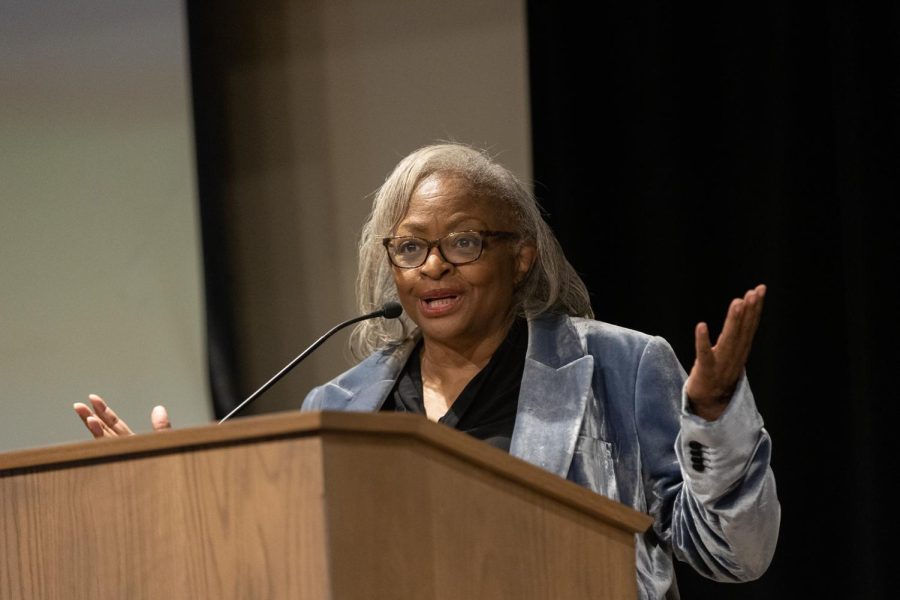‘We have an assault on teaching real history’: Keynote speaker Carol Anderson talks historic, current suppression of Black voters at 2022 Eric Williams Memorial Lecture
April 19, 2022
Taking the stage after a round of opening remarks, author and professor Carol Anderson smiled at the crowd, which included 50 in-person attendees and 60 tuning in via livestream, extending a warm welcome and thanks as the featured keynote speaker for the 2022 Eric Williams Memorial Lecture on April 14.
“What I’m going to talk about today is democracy in peril. We are on the brink. We’ve been here before, and we have got to fight to maintain this democracy,” Anderson said. “I’m going to start off with a story because I’m a historian, and we do stories.”
The annual Eric Williams Memorial Lecture began at Florida International University in 1999 to establish a platform dedicated to discussing relevant issues concerning Black communities. In 2021, UT’s John L. Warfield Center for African and African American Studies assumed the position as host of the lecture series.
The lecture featured both Anderson, the chair of African American Studies at Emory University and author of “White Rage,” and an introduction from His Excellency Anthony Phillips-Spencer, ambassador of the Republic of Trinidad and Tobago. Throughout the approximately two-hour event, Anderson facilitated a conversation around the suppression of Black voters, the history of American voter suppression and the present systems that uphold it.
Anderson began her keynote with examples of voter suppression tactics in post WWII America and their persistence in the past few years.
“The message was clear: you vote, you die,” Dr. Anderson said. “When we think of the disenfranchisement of the Jim Crow era, that’s how we think of it — this massive physical violence raining down on the Black community, pushing them away from the ballot box.”
Addressing the 2020 election and the emerging debate over voter legitimacy, Anderson said both government officials and press mouthpieces spread the false narrative that the upturn in voters was due to conspiracy rather than increased efforts to get underrepresented groups to the polls.
“The lie of massive rampant voter fraud was just that: a lie,” Anderson said. “The power of a lie is if you say it enough times, it sounds like the truth, and people begin to believe it — particularly when you have it cloaked in the aura of respectability.”
Receiving questions from the crowd near the end of her presentation, Anderson spoke to the public’s lack of awareness of the dangers of African-American voter disenfranchisement. She said the issue lies in a refusal to implement honest lessons in schools.
“We have an assault on teaching real history,” Anderson said. “Real history is hard. Real history forces us to come to terms with what was, what is and what we’re going to be. If we can live in a fairy tale land where we don’t have to deal with real history, we’re actually sleepwalking into a catastrophe.”
Sharing historical accounts of political violence and repression against African-Americans in election years, Anderson said the calling to protect democracy and uplift voters’ voices remains greater than ever.
“What is so important for us to understand is that those who (implement these policies) treat voting as a privilege, (like) something you have to earn, (but) voting is not a privilege,” Anderson said. “Voting is not an obstacle course. Voting is a right, and we have to fight for that right.”



